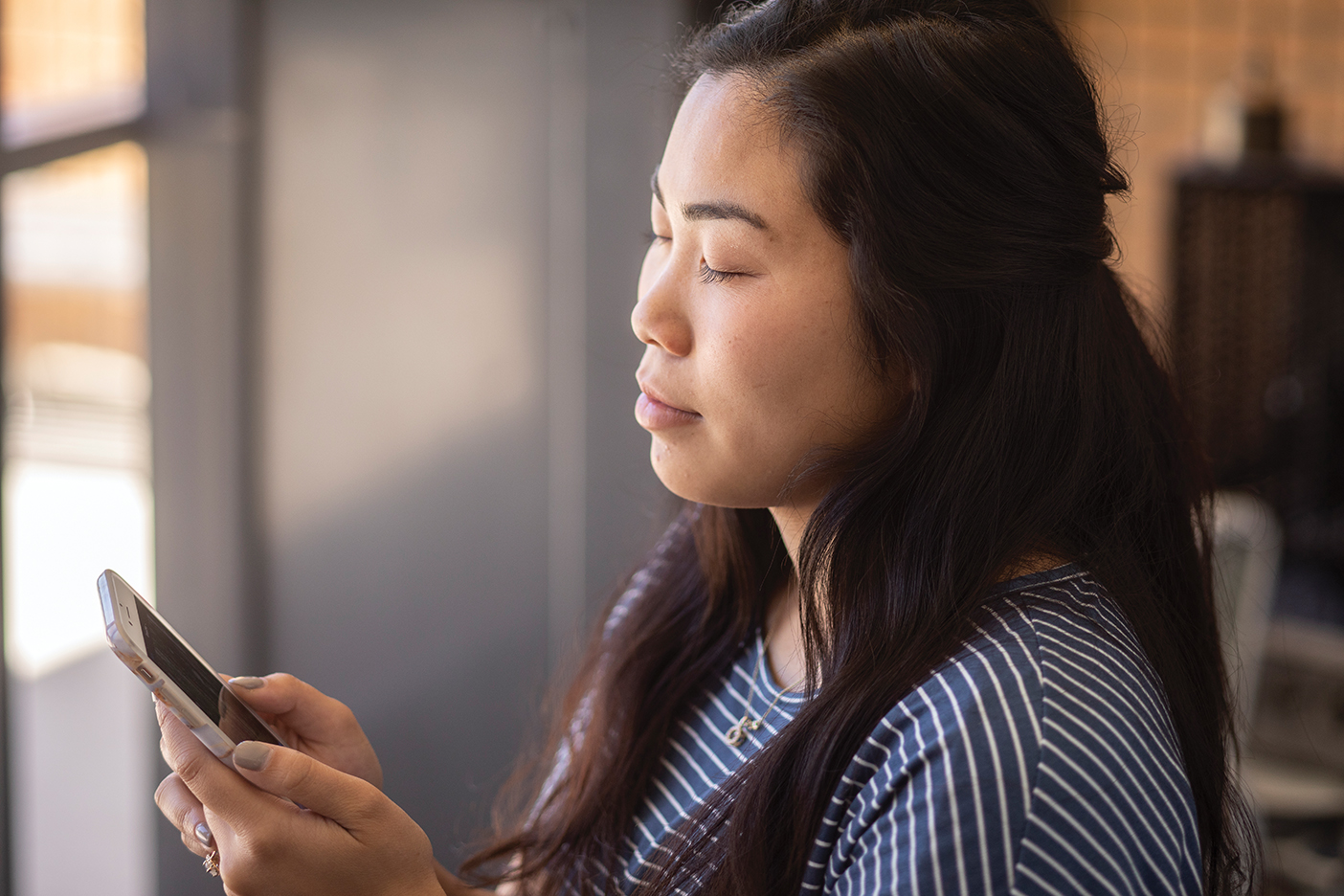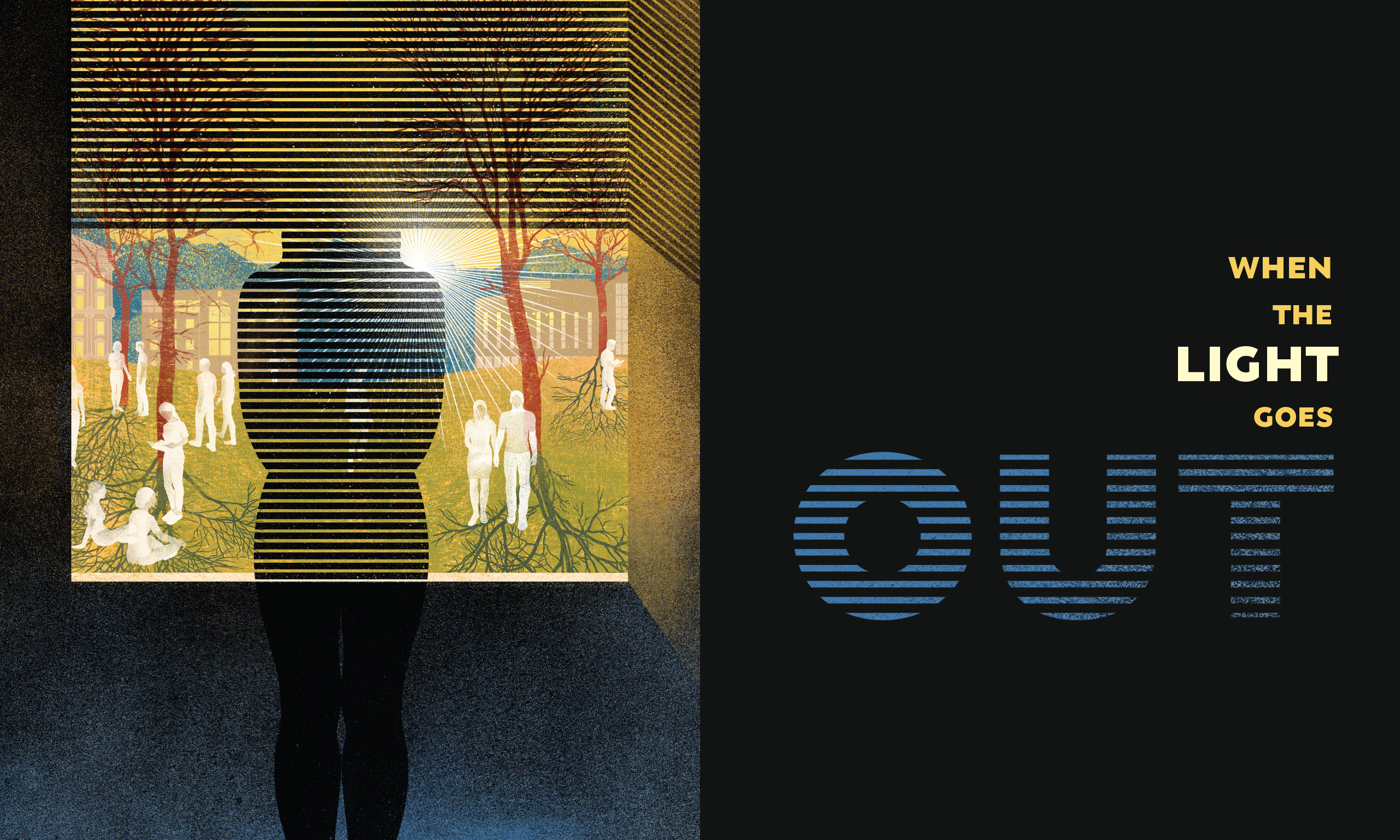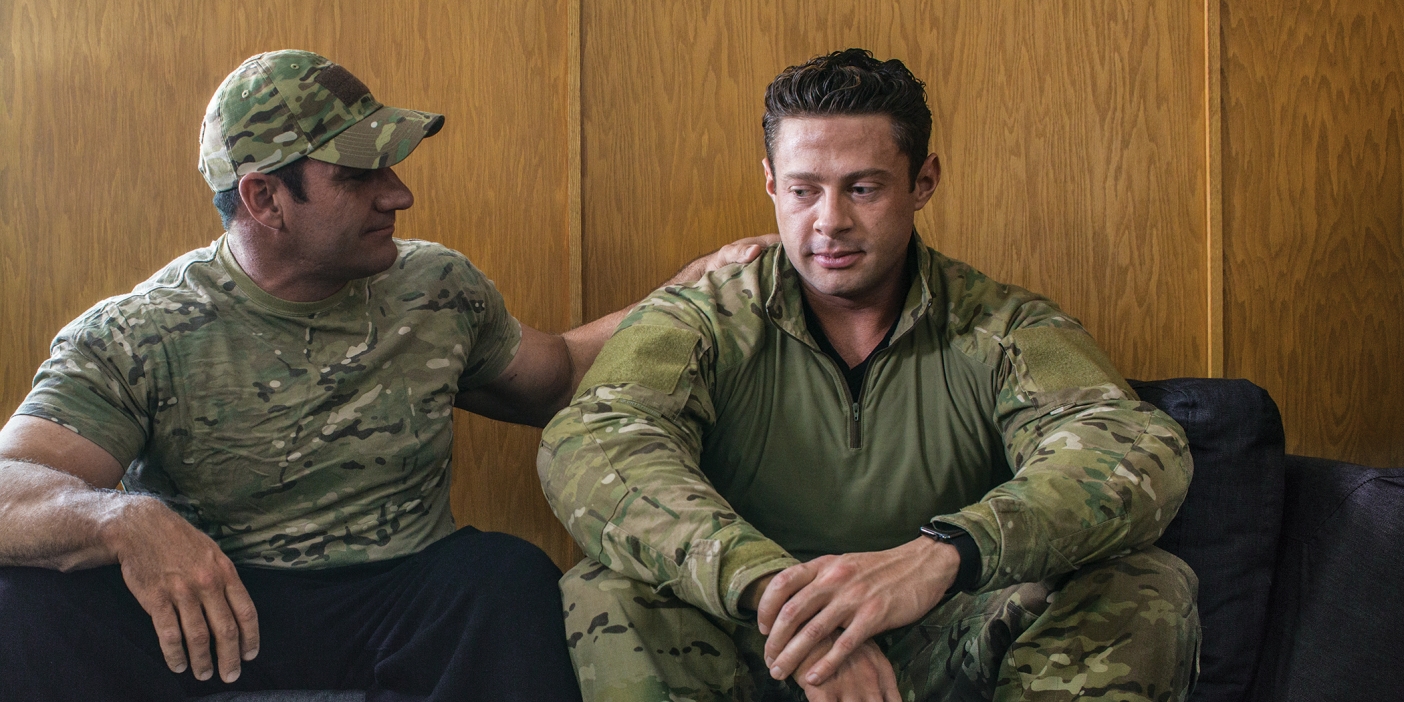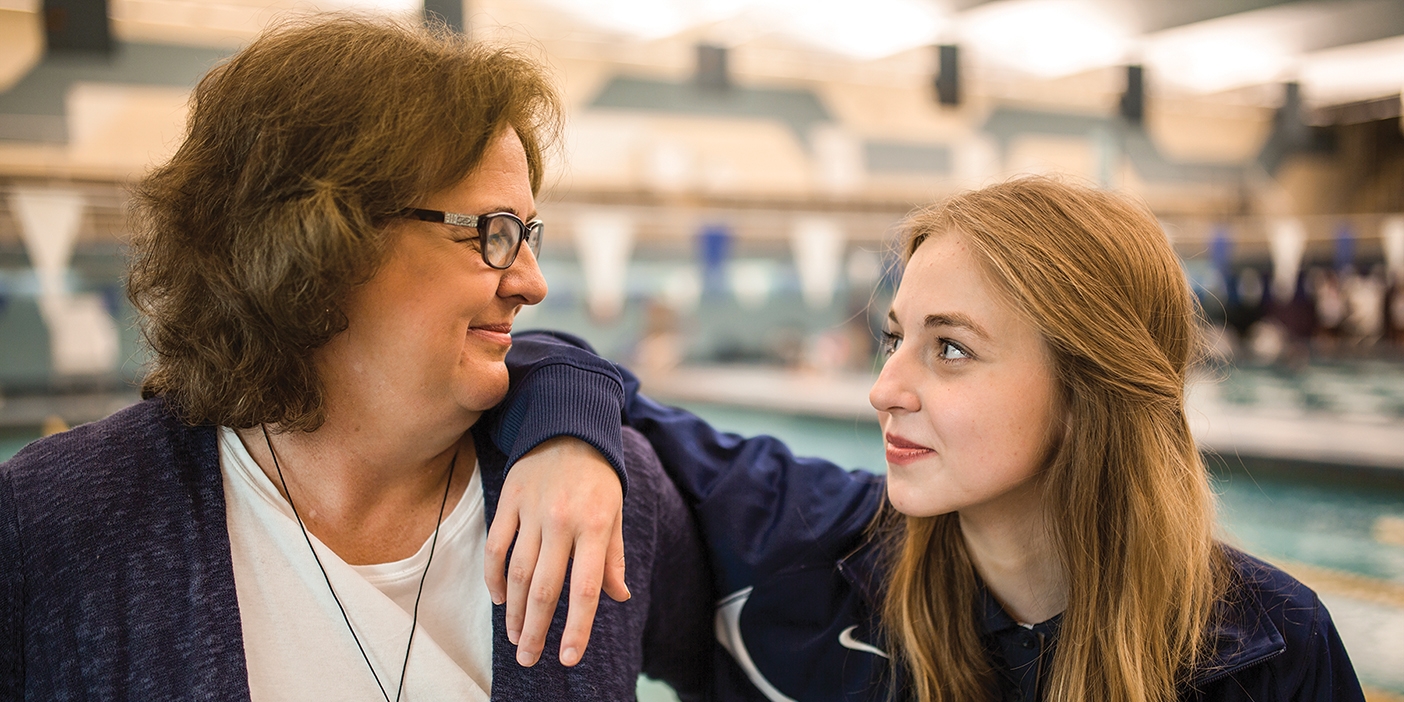Apps are filling gaps for those who want to improve, mentally or physically.

For more than seven years now, recent psychology grad Taylor E. Mefford (BS ’18) has been dealing with anxiety, especially when he thinks about the future and looming deadlines. For him, anxiety causes tightness in his chest and trouble concentrating. “When I’m feeling anxious, I get so worked up about the task at hand that I can’t even focus on it,” says Mefford. “To make matters worse, I’m physically uncomfortable because I can hardly breathe.” He’s experienced his share of counseling but now relies more heavily on smartphone apps to manage his symptoms.
“It’s much cheaper than therapy and also allows for greater flexibility in treatment. Some people don’t want to have a therapist holding them accountable, and the autonomy can be really freeing,” says Mefford, who will begin a master’s in counseling at Fordham University this fall.
He finds that Headspace—an app that teaches meditation and mindfulness—helps him address his anxiety. “Mindfulness is about taking your attention away from the future to focus on the present instead. Headspace provides a guided method for what to focus on and how to focus on it in a way that keeps future events where they belong—in the future,” says Mefford.
According to a trio of BYU health-sciences professors, Mefford is not alone in finding meaningful support from apps for emotional, physical, and nutritional health. “Mobile technologies are everywhere, and millions of people are using them with the hope they can improve their lives—but do they actually change behavior? The answer is generally yes,” says professor Joshua H. West, who studies the apps with Benjamin T. Crookston (BS ’03, MPH ’06) and P. Cougar Hall (BS ’98).
Although mobile technologies are often associated with harming health, the professors believe self-help apps are technological blessings and have the potential to help just about anyone move to a higher level of mental and physical health.
Mobile Emotional Support
Anxiety is one of the most common mental-health disorders in the United States today, with 18 percent of adults affected, according to the National Institute of Mental Health. Another 6.7 percent of adults experience major depression, and millions more suffer from challenges ranging from phobias to attention-deficit disorder. Many adults don’t seek professional help for mental-health conditions, or they delay getting help until they’ve suffered for a long time. Self-help books, seminars, and online courses have been filling these gaps, and now smartphone apps are joining the mix.
“Apps for mental health are a serious paradigm shift, and we wanted to study how effective they are,” says West. Among the 150 participants who responded to a survey from the researchers, 89 percent agreed that apps were helpful (with 45 percent agreeing strongly). “They were motivated to set goals and had higher confidence they could be emotionally healthy,” says West. “And they also reported significant change in behavior.”
Mefford considers his anxiety well managed now. He’s used about a dozen apps over the years and thinks many more people ought to try them. “They have a lot of potential, especially for people who are new to dealing with depression and anxiety or just are dealing with a dark episode in their lives,” he says. He plans to use apps in his future counseling practice to augment therapy and to give clients support between sessions.
Get Moving
On Jan. 1, 2015, Jerry A. Fails (BS ’01, MS ’03) kicked off a personal program to lose weight and get fit. After six months, he’d lost nearly 100 pounds with the help of both a Fitbit (a device that detects motion and connects wirelessly to a smartphone) and MyFitnessPal (an app that tracks diet and exercise). Years later, he’s kept most of the weight off and continues to exercise. “FitBit exposing my activity—and inactivity—helped me more fully realize where I was and helped me gradually increase my activity,” says Fails, a computer-science professor at Boise State University. “I now have a much more active lifestyle.”
For many decades now, the triple threats of heart disease, stroke, and type 2 diabetes have been the leading cause of death among Americans. All are related to obesity, which often can be overcome with a healthy diet and physical activity. But only one-fifth of Americans get the recommended amount of exercise, which is about five hours per week of moderate-intensity activity (the minimum recommended is 2.5 hours).
“With so many adults so far from where they should be, we need more creativity and innovation to get people moving,” says West. “Apps are one prong in the multipronged approach needed.”
In a second study, he and his colleagues analyzed 207 responses to a survey about physical-activity apps (respondents were half women and half men). About 40 percent of those surveyed used either a Fitbit or MyFitnessPal and reported high satisfaction and success in reaching health goals.
“We think one of the mechanisms that makes these apps work is immediate feedback,” says West. “Most of us change our behavior more easily if, when we’re trying something new, we know right away whether it’s working or not.”
For example, if a woman walks six long blocks and her Fitbit tells her she’s burned 50 calories and accomplished 30 percent of her daily goal, she’ll likely be motivated to walk farther to burn more calories. West says frequent app usage helped users meet their goals, with about 89 percent using the apps either daily or several times a week.
Bites and Bytes
While physical activity is important for overall health, studies show that diet is the most important factor for maintaining a healthy weight. In a third study, West and colleagues surveyed 217 users of apps that track nutrition. Most participants agreed or strongly agreed that apps helped them set goals for better eating and succeed at eating a healthy diet more often and more consistently. (The survey did not cover weight loss.)
Fails used MyFitnessPal to track his food intake and found it life changing. “It’s as easy as scanning a bar code with your smartphone or typing in a food. Over time, I found myself interested in more than just calorie counting—I wanted to know more about the quality of the food I was eating,” he says.
West believes app developers could improve diet and nutrition apps by incorporating more real-life, proven practices from the non-digital world: “It’s doable but will require them to more intentionally integrate what researchers know about how people change their behavior. Somewhere along the way, developers became more interested in the user interface and have neglected behavior research,” he says.
The Power of Self-Efficacy
The BYU health experts say apps can increase users’ “self-efficacy,” or their ability to cope with challenges in a sustained way, adding power to any efforts to achieve emotional and physical health goals.
“We’re finding that mobile phone apps increase people’s confidence that they can change,” says West. “In a lot of ways they’re like a good therapist or a good coach, except apps are available 24/7, and users don’t have to worry about any judgment if they fall short. It’s all just between them and their cell phone.”
Sidebar: Choosing Apps
As apps proliferate, it can be challenging to narrow the field and find one that fits your needs. Here are a few apps suggested by the Anxiety and Depression Association of America, Psycom, Healthline.com, and Kaiser Permanente:
• BreathetoRelax (free) teaches breathing techniques to manage stress.
• MoodTools (free) helps users to track their thoughts so they can identify distorted thinking and improve their mood.
• HeadSpace (variously priced subscription levels) focuses on guided meditation. It offers both short and long sessions for beginners and experts.
• Happify (free) helps diminish negative thoughts and increase resilience.
• PocketRehab (free) instantly connects users with one another for sobriety support and encouragement.
• My3 (free) provides education and encouragement to those with recurring thoughts of suicide. Users choose three people to help them stay connected, making them less likely to act on destructive thoughts.
• Idealweight (free) provides users with a personalized ideal weight range.
• MyFitnessPal (free for basic use) helps users count calories with its exhaustive list of grocery items.
• Pacer Pedometer and Step Tracker (free for basic use), tracks your steps (smartphone must be in your pocket or purse) and provides workout videos.
Sue Bergin is a writer and Marriott School adjunct instructor.












